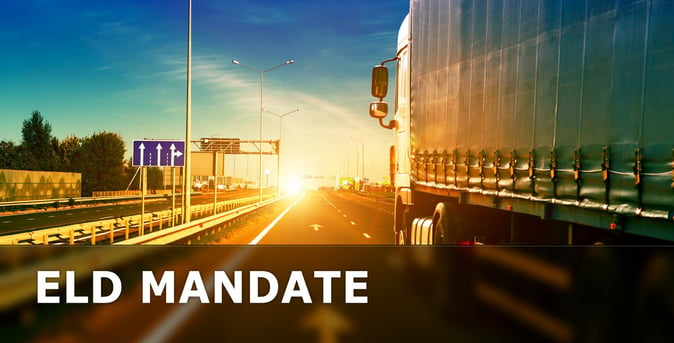REDWOOD LOGIN
Redwood PortalLTL
SCS
SCS Support
Rockfarm
Will you be compliant with the 516-page ELD mandate by December 16, 2017?
That’s right. The new Federal Motor Carrier Safety Administration mandate for Electronic Logging Devices (ELD's) will be active by the end of this year. But this isn’t something to be scared about. In fact, this mandate is expected to benefit the entire trucking industry for all companies, large and small.

Electronic Logging Devices monitor drivers’ stats like speed, mileage, hours, driving habits, and location. It connects to the truck’s engine to determine when and how the truck is in motion. It will pinpoint a truck’s location within 1 mile—10 miles if they are off duty. It also records the status of the driver, whether they are driving, sleeping or off. These devices then format the information for the trucking company to simplify inspections, audits, and data analysis.
Every company, no matter the size, will be targeted for compliance if:
Trucking companies that meet the above criteria should start focusing on compliance now. There will be hefty penalties for those companies that don’t comply. Plus, mandated ELD's will help you start saving money on fuel, man-hours, and paperwork.
But there have been rumors floating around about the efficacy of ELD and the compliance regulations of the ELD mandate. Below we’ll debunk the common ELD mandate myths to unlock the greatest value of use for ELDs.

When ELD's were first in use 20 years ago, they were on the pricier side. But still, trucking companies took a chance on them because of the cost-benefit on fuel, insurance premiums, man-hours, and more. Now, technology has progressed, and these devices are more advanced and highly affordable—while providing, even more, cost benefits. The average cost for an ELD is $500 per vehicle or a monthly subscription of $30 per month.
In fact, ELD's actually save money. The FMCSA estimates a yearly savings of $705, with 15% less vehicle downtime and 20 man-hours per vehicle per year. ELD's also improve vehicle utilization by 13%.
With paper logs, drivers have to round their shifts to the nearest 15 minutes. ELD's can track logged hours down to the second. Those few minutes per driver add up throughout the year and can create significant savings for trucking companies—especially smaller or independent businesses.
Moreover, the FMCSA that nearly 10% of annual fuel bills are spent on idle rigs. For every $70,000 spent on gas, ELD's can save nearly $6,000 per truck. That’s nearly a 9% cost savings per year just by installing an ELD.
Generally, ELD's save money on:
Some drivers complain that ELD systems make it harder to drive, but this is entirely unfounded. In fact, ELD's are the simplest and easiest way to log driving. Drivers simply log their status when they go on-duty, sleeping, or off-duty. They shouldn’t even look at the ELD log while they’re on the road, removing any safety concerns as well.
ELD's can actually help improve safety by cutting down the hours of service violations. They will not turn off your engine to stop a collision, but they log driving behaviors to make drivers more aware of unsafe practices. It can take drivers off the road who have been behind the wheel for too long, and it can boost awareness about braking, acceleration, and speed.
In fact, those rigs equipped with ELD's have shown a 5% reduction in preventable crashes and 12% reduction in all crash rates according to the FMCSA report. This equates to an estimated prevention of 30 fatalities and 562 injuries per year.
There have been accusations of ELD's shutting down trucks when there’s a violation. Because ELD's are connected to the truck engine, some ELD's do have the technology to stop the engine. However, it’s important to note that the new federal ELD mandate will not require an ELD to have this capability. That means that drivers can protest and file a complaint against any shutdown technology.
Truckers can often feel they are being monitored at all times with a tracking location, but that’s not the purpose of ELDs. Despite common conceptions, ELD's don’t automatically report violations. Only employees looking at the logs will know the location of the vehicle—and only for cost analysis and safety purposes.
When a truck driver is logged as off-duty, it will only pinpoint the truck’s location within 10 miles (as opposed to the typical 1-mile on-duty). If a driver is on personal time, he or she doesn’t have to worry about “being watched.”
In a similar vein, the government does not have access to truck location or ELD information. ELD's are not the trucking version of Big Brother. Although ELD's log violations (and some even warn a trucker before a violation is committed), these violations do not go directly to the state. Only authorized members of the company looking at the logs can access ELD data.
However, ELD data can easily and quickly be released to the government for roadside inspections and other instances when paperwork is requested. This makes the process simpler and more efficient, so drivers can get back on the road quickly.
Every trucking operation that meets the criteria is mandated to follow the ELD regulations. But that doesn’t mean this mandate will hurt smaller companies. Everyone can benefit from ELD's by saving money on fines, fuel, paperwork, man-hours, crash risks, and more. In fact, ELD's may even be more necessary for smaller businesses that need save every penny when possible.
With today’s smartphone technology, some drivers assume their phone GPS can function like an ELD. However, smartphone tech can’t connect to a truck’s engine to track things like excessive braking and acceleration. It also doesn’t connect directly to the company server for data formatting and tracking.
Besides, the FMCSA won’t accept smartphone data as an alternate for the federal ELD mandate.
However, some ELD technologies use a mobile app that’s synced to the ELD in the vehicle. This makes it easy for drivers to update status, perform inspection reports, log hours, and check their stats right from their phones.
The FMCSA did thorough research before implementing their ELD mandate. They have assured that these new regulations will benefit individual businesses and the industry as a whole. ELD's save money, improve safety, and increase efficiency for drivers and loggers. With advanced data collection, these mandated ELD devices will help make trucking operations more productive, efficient, and successful.